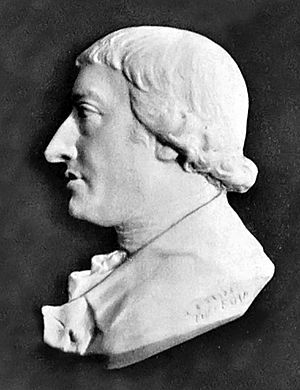Rudolf Erich Raspe facts for kids
Rudolf Erich Raspe (born in March 1736, died November 16, 1794) was a German librarian, writer, and scientist. He is most famous for writing a collection of amazing and funny stories called The Surprising Adventures of Baron Munchausen. These stories are also known as Baron Munchausen's Narrative of his Marvellous Travels and Campaigns in Russia. They were originally written to make fun of politics.
Contents
Early Life and Studies
Rudolf Erich Raspe was born in Hanover, Germany. He studied law at the University of Göttingen and the University of Leipzig. After his studies, he worked as a librarian at the University of Göttingen.
In 1762, he became a clerk at the university library in Hanover. Later, in 1764, he became the secretary for the university library in Göttingen. He was known as a very smart person who knew a lot about many different subjects. He was especially interested in natural history (studying nature) and antiquities (old objects and history).
Becoming a Scholar and Writer
Raspe wrote his own poems and also translated poems by Ossian into German. In 1765, he published the first collection of philosophical works by the famous thinker Leibniz. He also wrote about a book of old English poems.
In 1767, he became a professor at the University of Cassel and later a librarian there. He wrote a paper about animals for a science journal in 1769. Because of this, he was chosen to be a Fellow of the Royal Society of London. This was a big honor for scientists. He wrote many books and articles on various topics.
Challenges and New Beginnings
From 1767, Raspe was in charge of some collections for Frederick II, Landgrave of Hesse-Kassel. In 1775, he traveled to Italy to buy interesting items for the Landgrave. However, he sold some of the Landgrave's valuable items for his own benefit. Because of this, he had to leave Germany and move to England. He was also removed from the Royal Society that same year.
In London, Raspe used his knowledge of English and his education to earn a living. He published and translated many books. He helped translate a book about a trip around the world into German. He also translated German books into English. Even though he was very smart, he often struggled financially.
Work in Mining and Geology
From 1782 to 1788, Raspe worked for a man named Matthew Boulton at the Dolcoath mine in Cornwall, England. He was in charge of testing metals and managing the mine's supplies. During this time, he also wrote books about geology (the study of Earth's rocks and soil) and the history of art.
An interesting discovery linked to Raspe is the Trewhiddle Ingot. This is a piece of tungsten metal found in 2003. It might be over 150 years old, which is earlier than when tungsten was thought to be first made. Raspe was a chemist who was very interested in tungsten. It's possible he made this piece of metal during a visit to a nearby mine in the late 1700s.
The Baron Munchausen Stories
While he was in Cornwall, Rudolf Erich Raspe seems to have written the first version of the Baron Munchausen stories. These stories became very famous when another writer, Gottfried August Bürger, translated them into German in 1786 and added more details.
The Baron Munchausen tales have been loved by many generations of readers. They have also inspired several movies, including Terry Gilliam's The Adventures of Baron Munchausen. This movie was inspired by an earlier Czech film called The Fabulous Baron Munchausen (1961).
Later Life and Legacy
Raspe also worked with a famous publisher named John Nichols. He created a detailed catalog of a collection of gems and casts, which was a huge amount of work.
Later, Raspe went to Scotland. He found a supporter in Sir John Sinclair. Raspe tried to trick Sir John by pretending to find valuable metals on his land. He had actually placed the metals there himself! When he was about to be caught, he ran away.
Finally, he moved to Ireland, where he managed a copper mine. Rudolf Erich Raspe died in Killarney, County Kerry, Ireland, in November 1794, from a fever called typhoid.
Raspe's tricky mining activities in Scotland inspired a character in Walter Scott's novel The Antiquary (1816). The character, Herman Dousterswivel, is a German mining trickster. Walter Scott himself said that this part of his story was based on something that really happened.
See also
 In Spanish: Rudolf Erich Raspe para niños
In Spanish: Rudolf Erich Raspe para niños
 | Bayard Rustin |
 | Jeannette Carter |
 | Jeremiah A. Brown |


